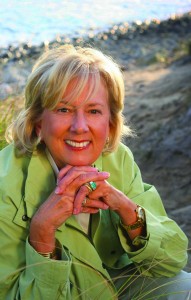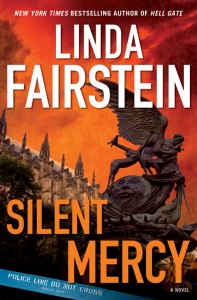Silent Mercy by Linda Fairstein
For over two decades, Linda Fairstein was the Chief of Sex Crimes Unit of the district attorney’s office in Manhattan and is America’s foremost legal expert on crimes of sexual assault and domestic violence. She’s a New York Times Bestseller and author of thirteen novels, including her latest thriller, Silent Mercy, which exposes the dark side of New York City’s diverse religious history.
Alexandra Cooper and Mike Chapman are on the hunt for a brutal killer scattering women’s mutilated bodies on the steps of religious institutions throughout Manhattan. Together they track a skillful and malicious murderer through the churches, cathedrals, and synagogues that were at one time centers of great power in New York City.
Library Journal called Silent Mercy “A tightly wound mystery that delivers an adrenaline rush with its fast-paced, nail-biting manhunt across several states.” Publishers Weekly said “Fairstein excels at describing New York’s complicated religious history as well as the vagaries of the city’s legal and religious politics.”
I had the pleasure, and honor, of being asked to interview Linda for this month’s edition of The Big Thrill, and here’s what she had to say:
In SILENT MERCY, Alexandra Cooper and Mike Chapman are on the trail of a serial killer who leaves women’s mutilated bodies on the steps of some well-known New York churches, cathedrals, and synagogues. They eventually discover there is a religious connection between the victims and the killer. The obvious question here is what inspired you to write about this type of murder?
 SILENT MERCY is the thirteenth novel in my series. In each of the books, New York City itself is as much a ‘character’ as my protagonist and her colleagues. I love to explore some aspects of institutions – museums, libraries, art galleries, hospitals – that seem so elegant or benign, familiar to all of us, but actually have a dark underbelly of criminal history. I’ve always been attracted to the religious institutions of Manhattan, which has often been called an island of churches. Whether the grand cathedrals and synagogues of the avenues, or the tiny jewels of churches in neighborhoods that have changed ethnicity over the years, I have always been inspired and uplifted by walking in and sitting to reflect. Once I knew my setting, I did the research to see what the controversies – the reasons to kill – have recently been in this religious world.
SILENT MERCY is the thirteenth novel in my series. In each of the books, New York City itself is as much a ‘character’ as my protagonist and her colleagues. I love to explore some aspects of institutions – museums, libraries, art galleries, hospitals – that seem so elegant or benign, familiar to all of us, but actually have a dark underbelly of criminal history. I’ve always been attracted to the religious institutions of Manhattan, which has often been called an island of churches. Whether the grand cathedrals and synagogues of the avenues, or the tiny jewels of churches in neighborhoods that have changed ethnicity over the years, I have always been inspired and uplifted by walking in and sitting to reflect. Once I knew my setting, I did the research to see what the controversies – the reasons to kill – have recently been in this religious world.
Throughout the investigation, Alex and Mike ask themselves what role religion plays in the murders. As a result they also look at the role of women in religious institutions. How often does religion actually play a role in violent crimes against women? In cases where it is a factor, even if the victim isn’t female, do those crimes fall under the category of hate crimes? How does a prosecutor decide whether or not a case should be handled as a hate crime?
I have to say – and I usually think I’ve seen everything in my thirty-year prosecutorial career – I did not have many cases in which religion played a role in a murder case. On the other hand, I was in charge of many investigations involving members of the clergy accused of sexually abusing young boys and girls. The international scandal about the extent of such abuse only erupted within the last decade, but there is a long, sad history about the way in which these matters were handled in the early days of my work in the district attorney’s office. Hate crime prosecutions really depend on the legislation in different states and jurisdictions.
Because of the nature of these murders, Alex and Mike have to delve into the religious history of New York in order to fully understand the killer’s motives. How much research did you do on this subject and what were some of the more surprising or interesting details you uncovered?
I love doing research. I’m not a fan of crime novels that are just about shoot-outs and car chases. It’s more interesting for me to learn something as I write each book, so I am constantly doing research – which continues throughout the entire process, often until I’m into the last scenes. The surprises for me started with the first chapter setting. I visited an old church in Harlem – Mount Neboh Baptist Church – and was startled to see that there were stars of David in the magnificent old stained glass windows – and Hebrew writing as well. Little did I know that in the early 1900’s, Harlem was largely a Jewish community, and Mount Neboh was built as a synagogue. Not long after, the owner of Rao’s restaurant (the great Frankie Pellegrino – who played the FBI agent in charge of the New York office in THE SOPRANOS – asked me if I had ever been to the old St. Patrick’s Cathedral. I didn’t know that there was one. That’s the kind of hint that gets me off and running, really whets my appetite. You can see the glorious old St. Pat’s in the video on my website.
The killer leaves his victim’s bodies in very specific locations that are meant to be clues toward his motives. Where you concerned about using actual locations, such as steps of Mount Neboh Baptist Church in Harlem, as the backdrop for some fairly gruesome crime scenes?
I’ve never really been concerned about using real locations in New York. Bad things have happened almost everywhere. We’ve had rapes – rapes by strangers – that have occurred in churches, so that’s not a stretch. We’ve had the tragic rape-murder of a doctor in one of our largest hospitals, and one of the most famous art gallery owners in the city was involved in the sado-masochistic murder of a young tourist. Lots of ‘landmark locations’ have been the scenes of our crimes. It’s one of the things that fascinated me as a rookie prosecutor, and still amazes today.
Alex has worked her share of high-profile cases, and in SILENT MERCY, she’s prosecuting a defrocked priest accused of child molestation in addition to working with Mike on the serial killer case. When a case suddenly becomes the focus of the media, as trials of this nature often do, how hard is it for a prosecutor to remain objective?
The high-profile nature of any case poses the potential of being a distraction for all the parties involved. It should not have any effect on the objectivity of a prosecutor. You have to be able to do your work – focus on a fair and impartial analysis of the facts, and then the careful presentation in front of the jury – regardless of the media circus that sometimes swirls around major crimes. Because my specialty was special victims work – rapes and homicides – I got accustomed to media attention at a pretty early stage of my career. You just have to keep your head down and focused on the same goals as in any other case: getting at the truth and trying to do justice. We’ve all seen miscarriages of justice when these rules are violated – I’m thinking of the Duke lacrosse team ‘rape’ allegations – and I like to think my office did well at getting it done right.
SILENT MERCY is your thirteenth novel featuring Alexandra Cooper. What do you believe is the key to not only creating a long-running series but sustaining it?
I’ve read widely in this genre, which has given me years of great models for keeping a series fresh. Our readers are demanding – they’re smart and they know what to expect from my colleagues, masters of the genre. I think the continuing characters have to evolve and grow – to reflect changes in their lives as a result of their experiences. For me, in the sense that my thrillers have a strong procedural element, I have to stay up to the minute with cutting edge forensics – which fascinate me anyway. If you’re lucky – and I know I have been – many fans connect to your protagonist and her world and come back to see her in book after book. I’m always thinking of my best readers. They keep our toes to the fire.
You were the Chief of Sex Crimes Unit for the Manhattan district attorney’s office for over two decades and are one of America’s foremost legal experts on crimes of sexual assault and domestic violence. It may seem like a silly question but why did you choose to start writing fiction? Did you always have an interest in writing?
Writing fiction had been my dream since earliest childhood. My father used to roll his eyes and remind me that I had nothing to write about – I needed to get a career. But I went to Vassar College – the last all-women’s class – because it had a great English lit department and I wanted to learn the skills of a good writer. When I realized before graduation that I wasn’t likely to support myself as a writer, I followed my second goal – which was public service. Law school opened the door to the greatest prosecutor’s office in the country, at a time (1972) when there were very few women serving as litigators in the criminal courthouse. But I never abandoned that first dream of writing, and my career in the law gave me plenty of material with which to fulfill that dream.
Final question: What can readers expect next from both you and Alexandra Cooper?
You never know where Alex, Mike and Mercer are likely to take me. There are eight million stories in the naked city, as the TV tagline to that show said. I’m always looking for something thrilling to weave into one of Coop’s capers. Thanks so much for letting me talk to everyone at ITW.
Thanks, Linda, for taking time out of your schedule to chat. Congratulations and wishing you much success with SILENT MERCY!
- The Arranger by L.J. Sellers - September 1, 2011
- Broken by Debra Webb - May 31, 2011
- Dogs Don’t Lie by Clea Simon - March 31, 2011

